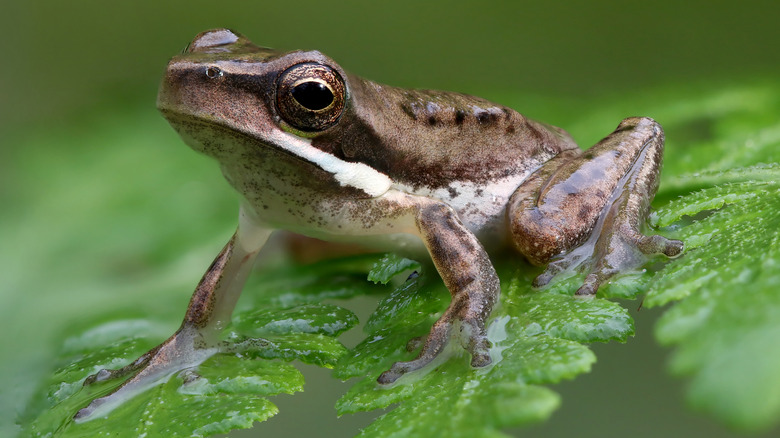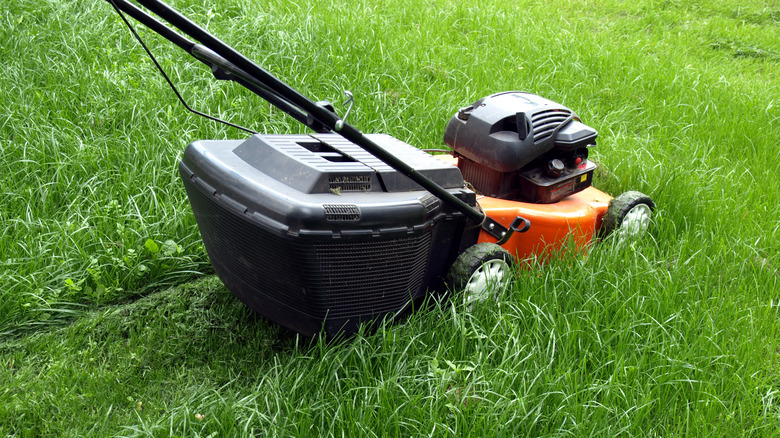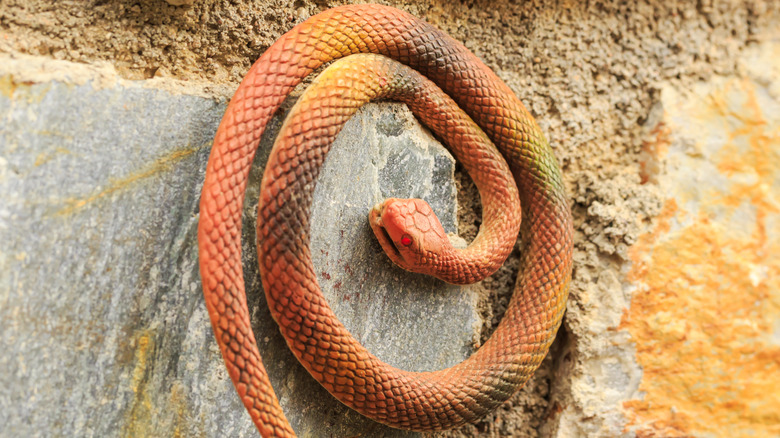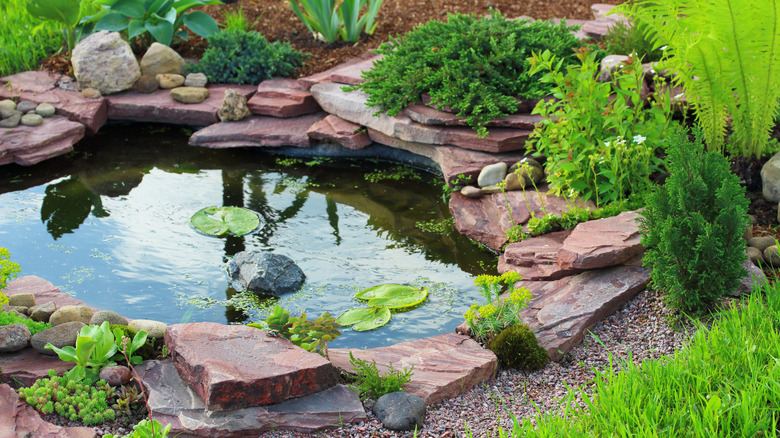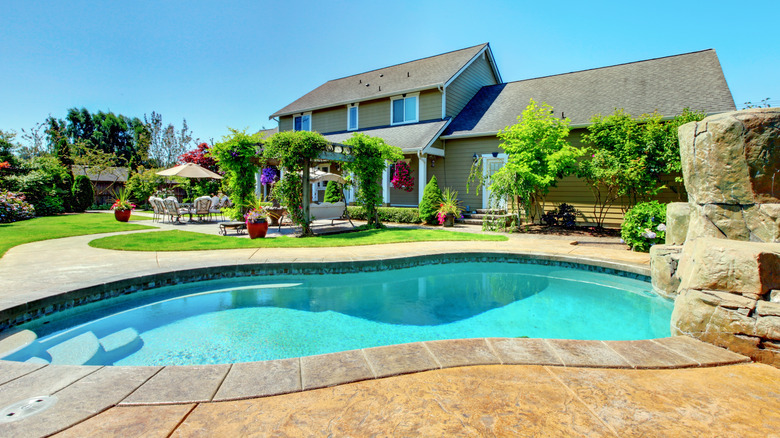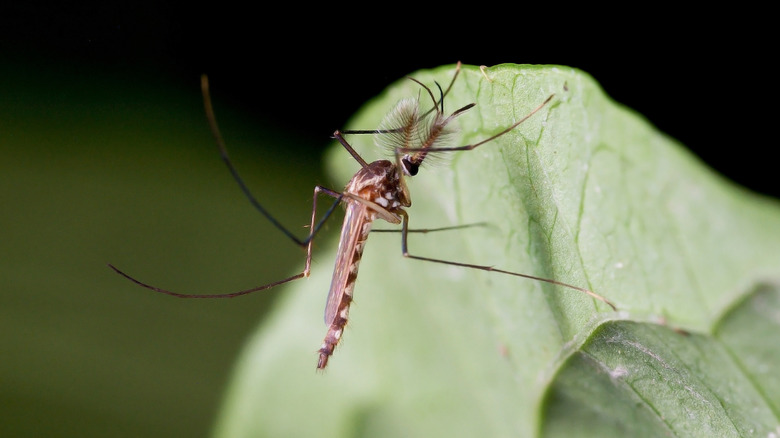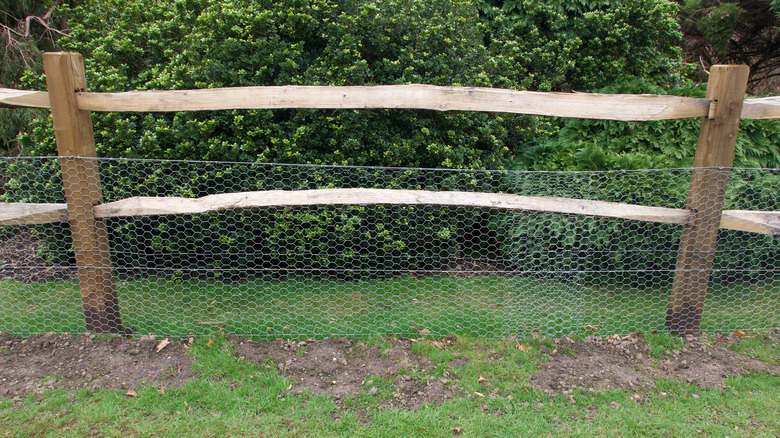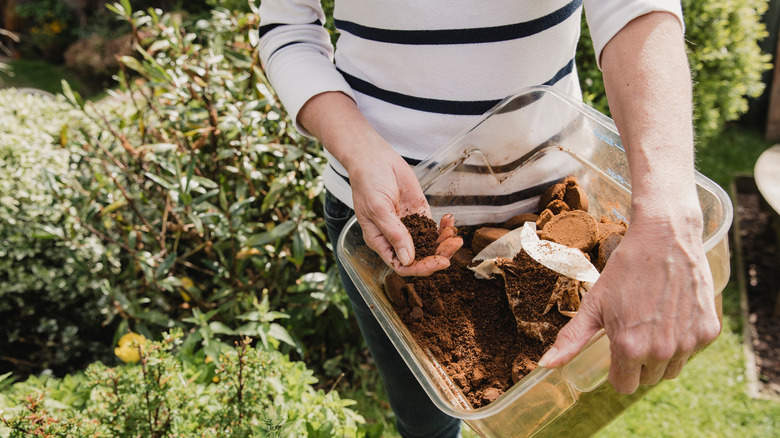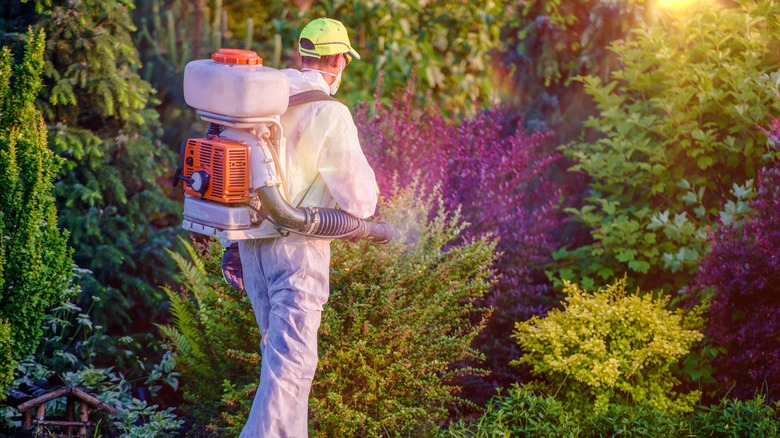8 Best Ways To Safely Get Rid Of Frogs From Your Garden
One of the benefits of having a garden is the tiny critters who stop by to enjoy the flowers, shrubs, and even an occasional veggie. Depending on where you live, your garden might attract bees, butterflies, bunnies, and even frogs. While there are plenty of reasons why you might want a few creatures making their homes in your yard, there are also times when frogs can create problems.
On the plus side, Bob Vila notes that a frog's diet can consist of pests like flies and mosquitoes, not to mention the fact that they may simply put a smile on your face when you spot one in your garden. However, they can also become rather loud at times which can become incredibly annoying. Beyond that, you may not want to deal with what happens when the frogs meet up with your kids, pets, or (eek!) lawnmower. These issues can become even more of a problem if the frogs start to multiply and you end up with an infestation in your yard.
But don't worry! If you want to control the number of unwelcome hoppers in your garden or get rid of them completely, here are eight of the best ways to safely get rid of frogs.
1. Eliminate frog hiding places
If you've noticed frogs in your garden, then you might have also spotted them in other places in your yard. In fact, there are a few specific spots where frogs tend to hang out; think along the lines of anywhere cool, damp, and covered, which makes sense since they don't want to get too hot and dry or be spotted by a predator that might eat them. Frogs would much rather spend their time in a place where they feel safe, according to My Backyard Life. Because of this, if you eliminate the areas that frogs are attracted to, then they may simply leave on their own in order to find a more suitable place to hunker down.
For instance, frogs don't like to be out in the open very often, so they make their way into the tall grass. Rid My Critters points out that this means you should keep the grass in your yard on the shorter side. You'll also want to keep the tall weeds away and keep your shrubs as trimmed up as possible.
On top of that, you'll want to get rid of any clutter in your yard which might give frogs a nice hiding spot. Anything from a pile of logs or bricks to forgotten kids' toys can give frogs cover, so you'll need to take a look around to see where the critters could be living in your yard and clean up any areas that might pose a problem.
2. Use fake predators to deter frogs
Unsurprisingly, frogs aren't fond of being in the same areas where amphibian-eating animals happen to reside. Although different frogs might fall prey to different predators depending on where you might be, there are a few common creatures that frogs will definitely want to stay away from — and that's something that you can take advantage of if you know how to do it.
According to Discover Wildlife, because frogs hang out both on land and in the water, they can find themselves becoming a tasty meal for various kinds of birds that might spot them from the sky above, as well as land and water creatures such as otters, shrews, lizards, and snakes. Toads N Frogs also notes that frogs can become a convenient snack for large fish, skunks, foxes, raccoons, and even other frogs. Of course, on top of that, Pet MD explains that your cat may want to nibble on a frog, which can make your feline sick.
Having these kinds of predators in your yard will make the area less hospitable for frogs. However, we totally understand why you might not be thrilled about the idea of keeping snakes around just to keep frogs away. In that case, X-Pest suggests placing a fake rubber snake in sight so that frogs think that there's a predator living in your garden. If that's still too creepy for you, then perhaps a fake heron, fake raccoon, or fake otter would do the trick.
3. Get your pond water moving
If you have a pond in your yard — either a tiny ornamental one or a massive natural one — then you might know that it can be a prime spot to find frogs. The wet conditions of a water feature combined with a lush garden are the perfect mix for froggy friends. What makes a backyard pond even more attractive to frogs is if the water tends to be still or if the pond has calmer spots.
If you want to keep your pond but get rid of the frogs that have made it their home, then you can try to get the water moving a little bit more. Rid My Critters explains that putting a circulation pump or a water filter into your pond can make sure that the water stays in motion. This will apparently annoy frogs and make them less keen to stick around or lay eggs in your pond.
Want a few other ways to keep the water in your pond from getting too still and stagnant? This Old House suggests opting for a fountain, waterfall, or even a bubbler (which does exactly what it sounds like it does). While each of these features can make you fall in love with your pond even more than you surely already are, it will have the opposite effect on frogs.
4. Protect your pool from frogs
In the same way that a pond in your garden area can attract frogs, a pool can have the same outcome. Frankly, frogs can't tell the difference between a natural river, an ornamental pond, and a pristine pool. However, there's a good chance that you're not interested in swimming with frogs.
Treehugger notes that the chemicals used to keep your pool clean can be harmful to animals; both chlorine and saltwater can find their way into and through a frog's skin which can obviously make it sick or even kill it. That's not the only danger a pool poses to frogs! Because pools tend to lack the rocks, logs, and plants that frogs use to hide under, they can be spotted and therefore nabbed by predators much easier. Frogs can also have a hard time getting out of a pool if they can't find their way to any accessible or manageable stairs. Eventually, if they get too tired from swimming, they can drown.
Although putting a cover over the water is helpful for when you're not using your pool, there's another handy solution: A FrogLog. A simple item that includes a floating platform for frogs and other small animals to climb onto, it also has a bridge-like strip that the critters can either crawl or hop up to where the FrogLog sits on the ground outside of the pool, which gives them an easy escape.
5. Get rid of frog food
If frogs have settled in your garden, then the area is likely offering them shelter, water, and something else that's key to their existence: food! According to Everything Reptiles, frogs tend to eat a wide variety of things. However, they particularly love to munch on insects like fruit flies, worms, spiders, crickets, grasshoppers, caterpillars, and beetles. Control Household Pests also notes that they'll eat mosquitoes, moths, and dragonflies. If these little critters happen to be in or around your garden, then they might be attracting frogs.
To get rid of pesky insects and bugs, it can be helpful to also get rid of stagnant water using the methods mentioned above. My Backyard Life also suggests turning off lights during the evening and nighttime because things like moths seek out the light. Beyond that, you can plant things in your garden to repel bugs, per Prevention, like citronella, lemongrass, mint, catnip, sage, petunias, marigolds, rosemary, lavender, and even basil. An obvious bonus to this method is that you'll have stunning flowers and tasty herbs in your garden while also keeping the bugs and, in turn, frogs at bay.
6. Build a frog barrier
While making your garden less attractive to frogs is certainly a way to get them to leave your property, that might not always work out as effectively as you might hope. In that case, X-Pest and Rid My Critters both note that you may need to take a more direct approach to keep the critters out of your yard. That's when you should consider building a barrier that will make it pretty much physically impossible for frogs to hop into your space.
So, what kind of barrier will work best? Well, that depends on your garden. While a simple low wall of neatly stacked bricks or rocks might work in some places, chicken wire could be a better bet in other spots.
If you want to give the latter option a try, then The Spruce suggests using stakes that are stuck into the ground around your garden or yard in an effort to first create a supportive frame in the area that you want to keep frogs out of. From there, just wrap the wire around the stakes and keep it in place with twist ties or zip ties. You can also wrap burlap around the chicken wire if you want something that even the tiniest frogs can't get through.
7. A range of repellents
Pretty flowers and delicious herbs aren't the only things that can keep frogs away from your garden; there are also more direct repellents that you can put to good use. Does frog repellent exist? Yes, it does! You can also try snake repellent, lizard repellent, or general pest repellent. You can buy them at outdoor or home stores as well as online. Just make sure that whatever you use is safe for your yard, family, and pets.
If you're interested in putting together a homemade frog repellent, then Hunker has you covered: All you need is vinegar, tap water, and a spray bottle. Spritz the mixture wherever you've spotted frogs or in areas that you want to keep free of frogs. The water-vinegar repellent leaves the animals with an uncomfortable burning feeling that will definitely make them want to get out of your garden. However, don't worry because the repellent won't result in any permanent harm to the little critters. Still, just like when you're dealing with pre-made repellents, you'll want to make sure that your homemade mixture doesn't harm any delicate plants in your garden so be a little careful when spraying away.
Don't happen to have any vinegar around or don't like the idea of leaving frogs with a burning feeling? Then how about using coffee grinds instead? BugWiz explains that frogs simply don't like the smell of coffee grinds, so they can also be used as a handy-dandy repellent.
8. Bring in the professionals
If you've already tried various methods of getting frogs out of your garden and nothing seems to be working, then it might be time to call in the professionals. That idea might immediately make you cringe due to the fact that you may assume that people who are paid to get rid of pests only use deadly methods. However, that's not necessarily the case. Own The Yard notes that some exterminators take advantage of humane ways to get rid of unwanted critters like frogs.
Nuisance Wildlife Rangers explain that traps can be used to gather up frogs that have ended up in your garden. Granted, they also point out that traps can't always be used in all areas without proper permission from your local authorities or government, so it's best to leave this up to those who do this work for a living. They'll know how to best trap the frogs and what to do with them once they're ready to be relocated and released. If traps are used properly, then the frog friends that you no longer want in your garden can end up living somewhere that suits them more. That way, everyone will be much happier!
